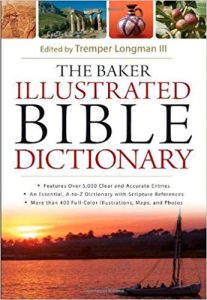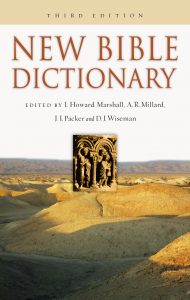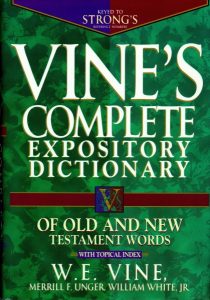A bible dictionary is one of the most common reference books people use to look up words and terms found in the Old and New Testament for the purpose of understanding Scripture better.
Some readers keep a bible dictionary next to their personal bible for easy access. Others utilize free bible dictionaries (see below for free downloads).

Still others use concise dictionaries that are found in the back of their study bibles. Anyone can learn how to use a bible dictionary quickly and easily, and transform their study of the Scripture virtually overnight.
Also see What is a Bible Concordance? to learn more.
So what exactly is a bible dictionary?
A bible dictionary is a reference book that contains an A-to-Z alphabetical listing of words, phrases, and names, as they are used Scripture, with an explanation of their meaning.
Like other kinds of dictionaries, bible dictionaries provide information about the language of origin, the pronunciation, and the various ways the word or term is used in the bible.
Scholars and experts in biblical studies and theology write the information found in the entries, which can range from a few sentences to multiple paragraphs. It’s common for a one-volume dictionary to have over 10,000 definitions.
The bible dictionaries available today have more in common than they have differences, yet there certain features and distinguishing characteristics that are helpful to know before selecting one to use or purchase.
Bible Dictionary: Examples
The length of entries in bible dictionaries varies depending on the subject matter. Commonly, more significant words and names have fuller descriptions and explanations.
For instance, in The New Bible Dictionary from IVP Press, the entry “Abednego,” a figure from the book of Daniel, is one paragraph long. The entry discusses the meaning and origin of his name, the context of his story, and a summary of his role in the book. This is suitable length for a person who is mentioned just 13 times in Scripture, and only in Daniel 2 and 3.

For another example, a few entries earlier, a more prominent bible figure, Aaron, is discussed in 10 paragraphs.
One paragraph is devoted to his family of origin, the next to his role in Moses’ ministry, followed by paragraphs on the golden calf story, his Levitical responsibilities, his wife and children, his legacy in the nation of Israel, and lastly, a summary of references made of him in the New Testament.
This is a suitable length for someone mentioned over 30 times in Scripture, in 12 chapters, and in five different books.
Example: “Manna” from Easton Bible Dictionary
The entry for “manna” in this bible dictionary provides the language of origin – Hebrew; the pronunciation – man-hu; the literal meaning of the word – “What is that?”; followed by how the word is used in the bible.
Heb. man-hu, “What is that?” the name given by the Israelites to the food miraculously supplied to them during their wanderings in the wilderness ( Exodus 16:15-35 ). The name is commonly taken as derived from man , an expression of surprise, “What is it?” but more probably it is derived from manan , meaning “to allot,” and hence denoting an “allotment” or a “gift.”
This “gift” from God is described as “a small round thing,” like the “hoar-frost on the ground,” and “like coriander seed,” “of the colour of bdellium,” and in taste “like wafers made with honey.” It was capable of being baked and boiled, ground in mills, or beaten in a mortar (Exodus 16:23; Numbers 11:7).
If any was kept over till the following morning, it became corrupt with worms; but as on the Sabbath none fell, on the preceding day a double portion was given, and that could be kept over to supply the wants of the Sabbath without becoming corrupt. Directions concerning the gathering of it are fully given (Exodus 16:16-18, Exodus 16:33; Deuteronomy 8:3, Deuteronomy 8:16).
It fell for the first time after the eighth encampment in the desert of Sin, and was daily furnished, except on the Sabbath, for all the years of the wanderings, till they encamped at Gilgal, after crossing the Jordan, when it suddenly ceased, and where they “did eat of the old corn of the land; neither had the children of Israel manna any more” (Joshua 5:12). They now no longer needed the “bread of the wilderness.”
This manna was evidently altogether a miraculous gift, wholly different from any natural product with which we are acquainted, and which bears this name. The manna of European commerce comes chiefly from Calabria and Sicily. It drops from the twigs of a species of ash during the months of June and July. At night it is fluid and resembles dew, but in the morning it begins to harden.
The manna of the Sinaitic peninsula is an exudation from the “manna-tamarisk” tree (Tamarix mannifera), the el-tarfah of the Arabs. This tree is found at the present day in certain well-watered valleys in the peninsula of Sinai. The manna with which the people of Israel were fed for forty years differs in many particulars from all these natural products.
Our Lord refers to the manna when he calls himself the “true bread from heaven” (John 6:31-35 ; 4851 -51). He is also the “hidden manna” (Revelation 2:17; Compare John 6:49, John 6:51).
English translations used in bible dictionaries
Like many bible study aids today, publishers of bible dictionaries often commit to using one English translation in the resource. They do this to maintain consistency in the entries and to serve the readers who are committed to a particular transition.
Some bible dictionaries reference multiple translations because they aim to discuss the different ways a word or phrase can be rendered into English. The back cover of the bible dictionary, the preface, or the introduction, are the most common places to find information about what translation is being utilized.
Classic Bible Dictionaries

The best-known, and most often-used, bible dictionary is called Vine’s Complete Expository Dictionary of Old and New Testament Words. Named after William Edwy Vine (1873–1949), an English scholar and theologian, Vine’s was originally published in four parts in 1940. The English words are cross-referenced to the King James Version of the bible. Hardback editions often exceed 800 pages in length. New copies can be found for around $20. Used copies can usually be had for around $5-$10.
Here is an example from Vine’s on the word “accuser”:
(Strong’s #1228 — Adjective — diabolos — dee-ab’-ol-os ) “an accuser” (cp. ACCUSE, B, No. 1), is used 34 times as a title of Satan, the Devil (the English word is derived from the Greek); once of Judas, John 6:70, who, in his opposition of God, acted the part of the Devil. Apart from John 6:70, men are never spoken of as devils. It is always to be distinguished from daimon, “a demon.” It is found three times, 1 Timothy 3:11; 2 Timothy 3:3; Titus 2:3, of false accusers, slanderers.
(Strong’s #2725 — Noun Masculine — kategoros — kat-ay’-gor-os ) “an accuser” (see ACCUSATION, ACCUSED, B. 4.) is used in John 8:10; Acts 23:30, 35; 24:8; 25:16, 18. In Revelation 12:10, it is used of Satan. In the Sept., Proverbs 18:17. Notes: (1) Sukophantia, “a false accusation or oppression,” is used in Ecclesiastes 5:7; 7:8; Psalm 119:134; Amos 2:8 (not in the NT). See No. 5, above. (2) Sukophantes, “a false accuser, or oppressor,” occurs in Psalm 72:4 ; Proverbs 28:16 (not in the NT).
Advanced/original language
Hebrew and Greek lexicons are high-level bible dictionaries that focus on the original languages of Scripture. The word “lexicon” has the same basic meaning as “dictionary”: “a book containing an alphabetical arrangement of the words in a language and their definitions” (Merriam-Webster).
In the genre of bible reference tools, “lexicon” usually signifies that the content is related to the original languages of Scripture. For example, a Greek lexicon, instead starting with words beginning with A, B, and C, it would start with alpha, beta, and gamma. Instead of ending with words that start with Z, it ends with those that start with Omega.
One of the most popular New Testament Lexicons is called Thayer’s, after the scholar who first published the book. This lexicon is coded to Strong’s concordance for those with little or no Greek knowledge.
Take the Next Step
A topical bible isn’t an advanced reference tool. Someone brand new to bible reading can use a topical bible to supplement their study, and it may prove to expedite their knowledge and understanding of the bible. 2 Timothy 2:15 says, “Do your best to present yourself to God as one approved, a worker who has no need to be ashamed, rightly handling the word of truth.” Study aids like topical bibles help readers correctly handle Scripture for personal growth and edification to the glory of God in Christ Jesus.
Free bible dictionaries
These dictionaries are in the public domain, so may be downloaded and distributed without charge.
- Vines Expositary Dictionary
- Eastons Bible Dictionary Smiths Bible Dictionary
- Smiths Bible Dictionary
Recent Posts
David Jeremiah, a renowned pastor, author, and speaker, has captivated the hearts of many with his compelling sermons. His messages resonate deeply with diverse audiences, leaving an enduring...
Tim Keller, a distinguished pastor, theologian, and author, has garnered a devoted following through the profound impact of his sermons. In this article, we will explore seven compelling reasons...
